Thought Leadership Studio Podcast Episodes:
Get Bold with Your Marketing with Brooke Janousek
Episode 50 - Interview with Brooke Janousek, the Grow CMO, on embracing boldness, leaving the comfort zone, aligning brand values, and the journey of the digital nomad
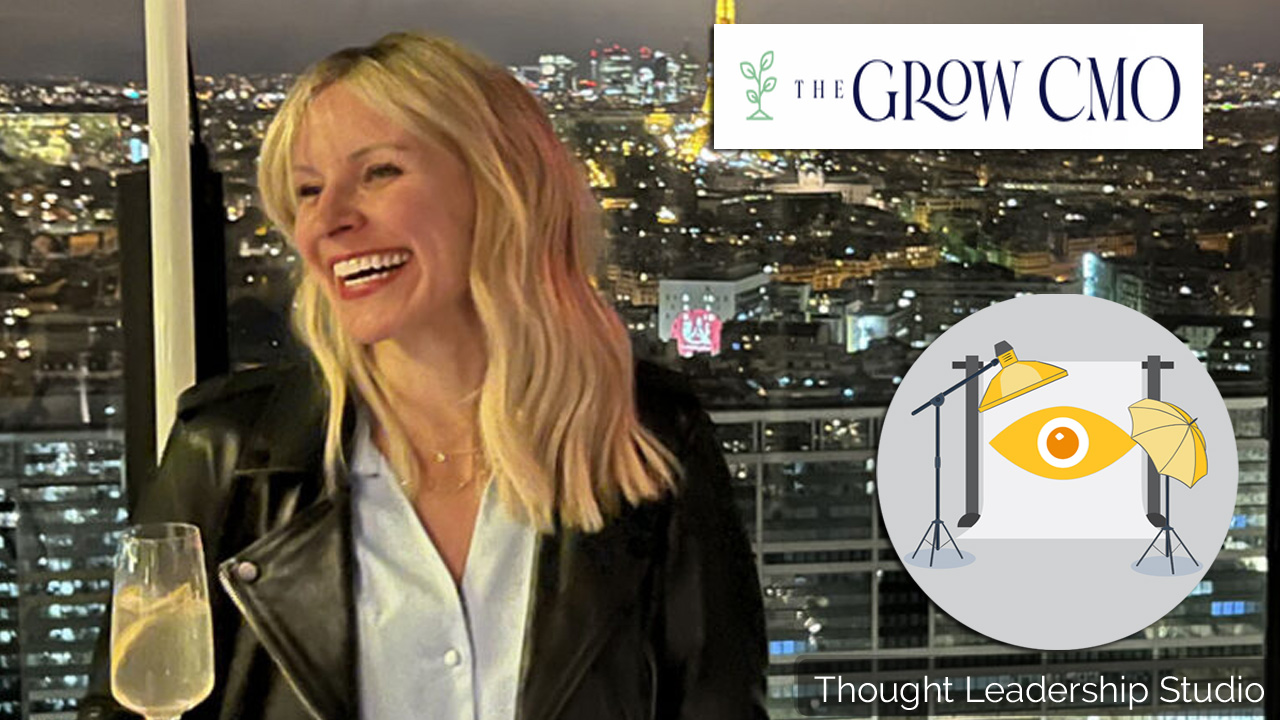
#digitalnomads, #entrepreneurship, #interviews, #marketing, #marketingstrategy, #storytelling, #thoughtleadershipexamples
Or Click here to listen or subscribe on appWhat this episode will do for you
:- Gain insights from Brooke Janousek, "The Bold CMO," on the power of embracing boldness in marketing strategies.
- Discover how being bold doesn't mean being reckless and how it's about taking a unique position to stand out.
- Understand the importance of aligning brand values with bold marketing efforts and standing by your values even in the face of challenges.
- Learn about Brooke Janousek's journey as a digital nomad, including the positive experiences, challenges, and lessons learned.
- Explore how embracing adventure and breaking out of comfort zones can parallel the principles of bold marketing.
- Discover strategies for managing work-life balance while working remotely and how to optimize your calendar for productivity.
Brooke Janousek, the Grow CMO.
In this episode, we're excited to introduce Brooke Janousek.
Brooke Janousek is a fractional CMO and digital nomad on a journey to intentionally live a joyful life. She is the founder of The Grow CMO, a fractional leadership solution for effective marketing growth that she founded in 2022 after two decades as a leading expert in the marketing industry. You can follow her digital nomad journey along with her “lessons on the road” at Brooke's website: Brooke on the Grow.
Some of Brooke's coordinates:
Curated Transcript of Interview with Brooke Janousek
The following partial transcript is lightly edited for clarity - the full interview is on audio. Click here to listen.
Chris McNeil: I'm Chris McNeil, with Thought Leadership Studio, and I'm sitting here with Brooke Janousek. Welcome, Brooke.
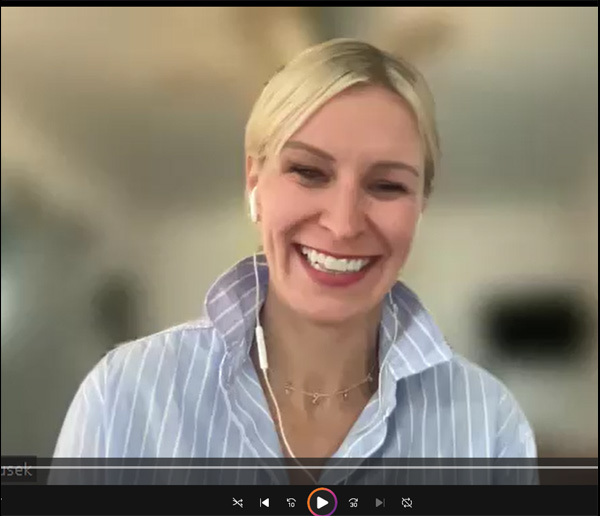 Brooke Janousek: Thank you. Great job in pronouncing my name by the way.
Brooke Janousek: Thank you. Great job in pronouncing my name by the way.
Chris McNeil: Oh, thanks. It didn't seem that complicated ... I guess I could have gone with a "Janoosez" French version. So tell us a little bit about what makes you "The Bold CMO" and how you came about this concept that you promote of boldness in marketing.
Brooke Janousek: Well, I think, to be honest, it is something that has evolved with me personally as I've gone through a personal growth journey in the last two or three years. I don't know that people five years ago would've said that I would be bold, but now that's definitely a brand quality that I possess and people are attracted to. And I think a lot has to do with just taking risks and seeing that they're paying off and being just authentically me. I think I've always been bold, but it's just kind of been suppressed. And finally in the last couple of years I thought, let's just let it out and see what happens.
Chris McNeil: Wow, that's awesome. So part of it is being comfortable with your authentic self perhaps?
Brooke Janousek: Yes, a hundred percent.
Chris McNeil: And my understanding is there's kind of a pivotal life event too, and tell us about that pivotal event. I think that'd be interesting.
There Were Two Pivotal Moments
Brooke Janousek: Yeah, so there's two, I think I know which one you're referring to, which I will tell the story of, but then there's also another one that I would be happy to share, but a year ago in March, I was at a conference called the Multi-Unit Franchising Conference, and it is a large conference for franchisors that is in Vegas, and they had 600 attendees, and the guest speaker was Jesse Itzler.
Now some people don't know who that is, and I had to explain it to several people as well because when I saw the banners, I was like, oh my gosh, Jesse Itzler is the speaker and my colleague, he goes, I don't know who that is. And I said, well, it's Sarah Blakely's husband. And then he goes, I don't know who that is. And I was like, oh my gosh, you don't know Sarah Blakely.
So for people who aren't aware, Sarah Blakely is the founder of Spanx. So she's the first self-made female billionaire and started out selling Xerox machines door to door in Florida and realizing that there had to be a better way to make a dollar, and she invented Spanx. So I've always followed her journey, just been very inspired by her entrepreneurial spirit, how bold she is. And Jesse, her husband is equally as bold and equally as accomplished.
And so he was the keynote speaker. So throughout the presentation he gives all of these very inspiring, very, it's a rally, and one of the things he said is, if you don't have a seat at the table, you make one. And his second point was, I don't negotiate my goals. So I'm sitting in the audience, I'm in a position where I have chosen a job that wasn't the best fit for me, and I knew it.
I knew in my gut this wasn't the right thing for me. And I was wrestling with do I resign, do I stick it out? There was just something in Jesse's speech that really moved me. He was taking questions at the end. I looked at my colleague to my right and I said, I'm going to go ask him a question. So I hop up out of my seat, I walk up to the microphone and I said, Jesse, I said, there are two things that you said that really moved me today. One was, you don't negotiate your goals, and two, if you don't have a seat, you make one a seat at the table, you make one. I may be going around circumventing the system here, but I would really like to know how I get an interview with your wife.
And he was dumbfounded. He stopped and he looked at me and he dropped the microphone for a second, and he's looking around at the audience and the audience is dead silent. And those split seconds, I was like, oh, I've made a horrible mistake. I've insulted him. This was not what I was supposed to do and this was not my intention.
And then he just got this huge smile on his face and he goes, I like you. He goes, meet me backstage, we will talk about this. And everyone just started applauding. I was getting high fives when I walked back to my seat and I sat down and my colleague goes, well, that is not what I expected you to ask. And so I did go backstage and Jesse was lovely. He gave me his personal email address and he asked me, what is it that you do and what do you want to do and why do you think Sarah can help you? So he asked some really great questions and I was able to email him.
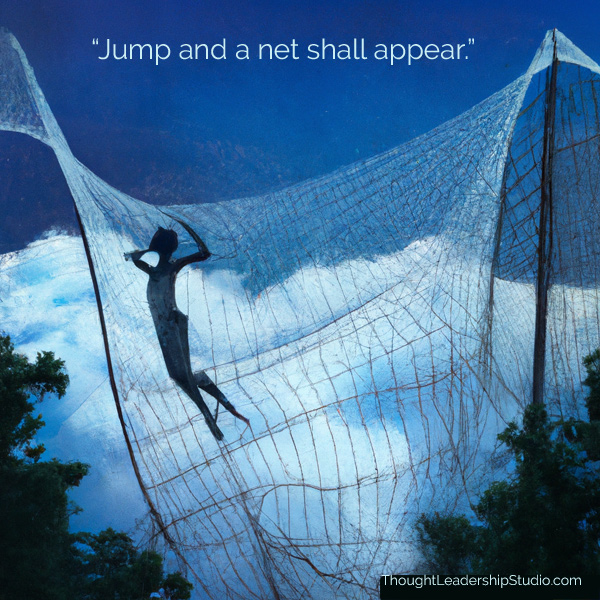 He connected me with Sarah's assistant and then she connected me with the director of HR at Spanx. So I would love to tell you that this story ends with me getting a job and being the C M O at Spanx. That is not what has happened. But I will say that was a pivotal moment for me because I took a bold move and had I not done that, I would not have realized what I was capable of. And three weeks later, I walk into the CEO's office and I resigned from that job.
He connected me with Sarah's assistant and then she connected me with the director of HR at Spanx. So I would love to tell you that this story ends with me getting a job and being the C M O at Spanx. That is not what has happened. But I will say that was a pivotal moment for me because I took a bold move and had I not done that, I would not have realized what I was capable of. And three weeks later, I walk into the CEO's office and I resigned from that job.
I just knew I had to do it. I had to make a seat at the table for something that I deserved and I wasn't going to negotiate the goals that I had set for myself that were being compromised at that job.
Chris McNeil: Fantastic. So you took a jump out of the comfort zone?
Brooke Janousek: I did. I did. One of my favorite sayings is jump and the net shall appear, and I saw an opportunity. I have been following Sarah's story forever, and I thought, this is the closest that I'm going to get to her. I might as well take this opportunity.
And not only did I demonstrate myself how bold and strong I could be, but I inspired others. I had several people come up to me at that conference afterwards and say, you're my hero. I can't believe you did that. Where did you find the courage to do that? And I've made some really good contacts from that and some really good friends as well, just from one bold move that inspired a lot of people.
Chris McNeil: Well, it's a very powerful move. The way I see it, it's like a powerful metaphorical story where you take the leap with confidence, you suspend your beliefs about who you are in the comfort zone you live in long enough to jump out, and you end up on this other space, this new territory, and you kind of look back and say, who was I then?
Was it a shift in identity for you?
Brooke Janousek: Right. Yeah. I fully believe that I would not have started my own business had that moment not occurred. Had I not had the courage to do that, I wouldn't have had the courage to say, okay, finally enough is enough. I'm going to resign and start my own business. It was a shift in my identity.
I knew that I was no longer going to negotiate my goals. I needed to set boundaries and no one else was going to do it for me. And so it was either now or never for me to take control. And I think he was inspiring. I was moved by the whole thing. I was just in the right mindset and take that leap really showed me that this isn't as painful or as scary as I thought it was going to be in my head. And so why not just continue to make bold moves in my career and in my personal life.
Chris McNeil: And you do that for others too, don't you? The power of bold marketing ...
Brooke Janousek: I do ...
Chris McNeil: =Maybe stepping out of the comfort zone of the norms of an industry? Or explain to our audience - if you would - and give them vision or your vision of what bold marketing means as opposed to non-bold marketing, we'll call it.
It's About What Will be Bold to Your Audience
Brooke Janousek: Yeah. That is a great question. So I want to be real clear that bold marketing doesn't mean that you are doing something intentionally for shock value. You're not trying to get that viral video, you're not trying to incite this discussion. And those things are very deliberate, and it's almost like I read this on LinkedIn the other day that social media is becoming unhinged, that people just think that they can say whatever and do whatever because it's going to get a reaction.
So that is not what I mean by bold marketing. What I mean is doing something that you always have to follow the fundamentals of who's our audience, understanding our persona inside and out, and then what's going to resonate with them, what will be bold to them? So you can look at a lot of examples where it has backfired and just to call out the Bud Light snafu right now, it was a bold move on their part.
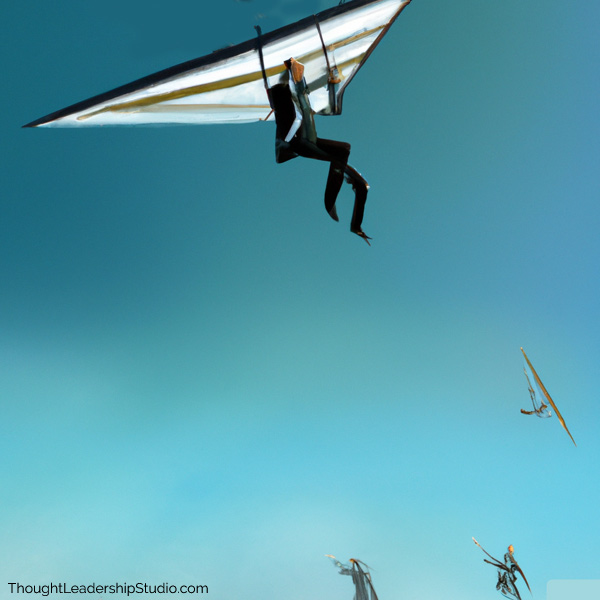 And I'm not saying that it was wrong that they did it, but I don't think that they really took the time to think, okay, our ideal customer persona may not align with what we're doing here, and they didn't really think that through and or we're not prepared to address what happened afterwards. So I think if I applaud the bold move, but I think that it probably was just the wrong mark for their audience.
And I'm not saying that it was wrong that they did it, but I don't think that they really took the time to think, okay, our ideal customer persona may not align with what we're doing here, and they didn't really think that through and or we're not prepared to address what happened afterwards. So I think if I applaud the bold move, but I think that it probably was just the wrong mark for their audience.
And so they took a risk and it didn't pay off, but I think it could have paid off. Had they approached it differently and just said, we're trying to go after a new audience. We're trying to attract different people, but the core of Bud Light drinkers don't align with that perception or that view. And so I think that was their miss. That's
Chris McNeil: That's a great clarification. So what you mean - if the way I'm understanding it is correct - is that being bold doesn't necessarily mean being reckless.
Brooke Janousek: Correct. That's a great interpretation. Exactly.
Chris McNeil: So what does being bold mean? Can you give us an example, illustrate story or a set of principles or a model that you would define? If you're meeting with me and I was a prospective client and I said, Hey, Brooke, what is bold marketing? What would it mean for us to be bold?
Brooke Janousek: Well, I think bold is a subjective word. I'm just going to say that. So I'm not skirting the answer, but I'm just saying it could be bold for your brand could be different than for the next brand. So again, thinking about what is our message and then being consistent and standing by it and not folding if somebody doesn't agree. Another example, Nike took a stand with Colin Kaepernick, and they said, we stand with you.
And they had a lot of people say, you know what? We don't want to buy Nike's anymore because we don't align. But Nike was like, that's fine. Hey, do your own thing. This is what we're standing for and we're going to continue to march forward. So that's an example of, Hey, we're going to go ahead and do something that we believe in, and if we lose customers over the deal, that's fine by us because these are the types of people that we want to align ourselves with and that's why we're taking this stand.
Chris McNeil: That's a strong statement in itself to say we care about our values more than making a quick buck.
Brooke Janousek: Yes...
Chris McNeil: We want to stand values that are more immutable and that may not appeal to everybody, but our values are important to us. Is that a part of being bold - to stand by your values?
Brooke Janousek: Yes. Standing by your values, knowing what those values are. You think about when you develop a brand from scratch or as some companies have to go through evolutions and potentially rebrand values is a core component of that brand development and what is our voice and our tone and how do the and tone reflect the values back to our consumers? And putting everything through that lens, I believe is really important, either from a personal branding perspective or from a corporate and even employment branding perspective.
What is Bold Marketing?
 Chris McNeil: That's awesome. Now, when people come to you and organizations come to you, are the coming to you for the boldness or do sometimes you sell them on the concept of boldness and maybe see the light bulb go off when they grasp and see and hear what that really means?
Chris McNeil: That's awesome. Now, when people come to you and organizations come to you, are the coming to you for the boldness or do sometimes you sell them on the concept of boldness and maybe see the light bulb go off when they grasp and see and hear what that really means?
Brooke Janousek: Yeah, I don't think anyone in particular comes to me and says, I want to be bold. They usually come to me with, I want to grow, or I'm having a problem with sales, I have flat sales, or perhaps we're reaching the wrong audience or our message isn't resonating.
And so I usually have to take it back a couple steps and really investigate and find out, okay, these are symptoms of a larger problem likely, and what is that? Nine times out of 10 when people come to me, the problem they're articulating isn't really the problem ...
Chris McNeil: If they knew what the problem was, they probably wouldn't have the problem anymore.
Brooke Janousek: Right. So it's not necessarily they articulate that we want to be bold - I think if somebody says that it's more that they want to stand out, they want to break through the noise, they want to break through the clutter in their industry. So how do we do that? And it could be boldly or it could be just being more clear.
There are so many people I work with that the message is not clear, and you would think that is such a basic thing, but you get so close to it and you think, oh yeah, that's clear to me, but is it clear to the intended audience? And nine times out of 10, that's sometimes not the case.
Chris McNeil: Well, it's a hard thing to do in our culture sometimes, and we're all brought up in this organizational climate of hierarchical thinking in a lot of cases, maybe not all, but a lot.
And the leaders and businesses who make the decisions usually aren't the ones who are on the front lines with the customer at that interface of transaction where they can really see and hear what the customer's pulling for, what's really meaningful to them. So boldness to me, and what I'm starting to get from this is the bravery to take a unique position. Would that be fair?
Brooke Janousek: Yes. That is a great assessment. You're very good at pulling the gem out of everything that I've been saying, so thank you.
Chris McNeil: I'm trying to just create an environment where you shine and you are.
Brooke Janousek: Thank you.
Chris McNeil: And I'm very intrigued by it because I believe in boldness. I've never articulated it that way, but it's a really meaningful way to put the bravery to stand out and take unique position where there's such unseen, invisible force pushing businesses to be commoditized. I do this kind of thing, so we should emulate everybody else doing this kind of thing here. I see it all the time, and I'm like, well, don't you want to be proprietary and stand out?
And that's a powerful way to put it because you're putting it in terms of emotion and organizations evoke emotions in customers and what emotion do you want to evoke? Something else I think is then I don't want to switch tracks if you want to go a little more into some of this stuff about what it means to be bold. But you're a digital nomad, is that right?
Brooke Janousek: I am, yes.
Chris McNeil: I'm so intrigued by that. I have digital nomad jealousy I've thought ... and haven't uprooted myself yet, or me and my wife and our dog to hop in a large travel machine and go around the world and work from anywhere. But I envy people that do, and I know there's a lot of people that aspire to that. So what's that all about and what's it meant to you?
Turkish Coffee for the Digital Nomad
Brooke Janousek: Well, I can give you the good, bad, and ugly of the digital nomad journey, and the good for sure has been the people that I've met, the experiences that I've had. That was something that when I set out to do this, I was very intentional that I'm going to live life joyfully. I'm going to seek out experiences that I have not had before in an attempt to learn something about myself and to have fun. I mean, that's the whole point of this.
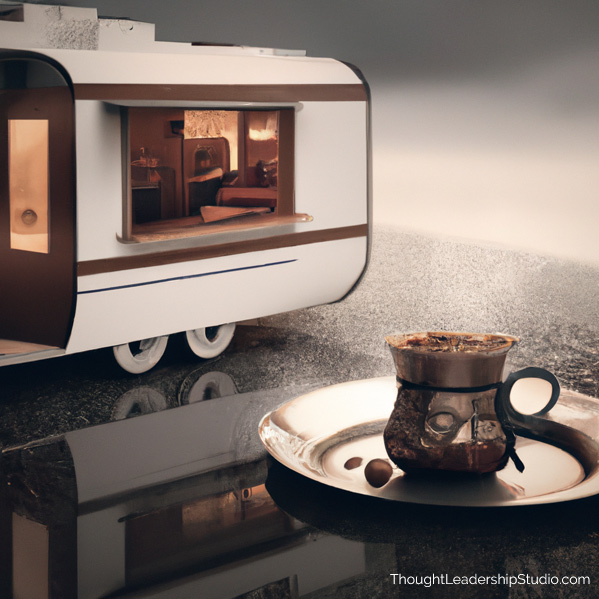 And so I have done amazing things. I got my first tattoo and then my second tattoo, I tried Turkish coffee for the first time. I plan on learning how to surf next month. I did something called drum boxing. I've done aerial yoga. So these are all things that I just intentionally sought out, big or small. You don't have to go skydiving to experience joy.
And so I have done amazing things. I got my first tattoo and then my second tattoo, I tried Turkish coffee for the first time. I plan on learning how to surf next month. I did something called drum boxing. I've done aerial yoga. So these are all things that I just intentionally sought out, big or small. You don't have to go skydiving to experience joy.
I mean, it can be these little things, like I said, a cup of well brewed Turkish coffee. So the bad part of it is, and maybe I'll turn this into a positive as well, is I have learned what I truly value and I really value routine. I know that if I'm in a routine, I am at my best. I can be the best friend, the best colleague, aunt, dog, mom, whatever. And when I'm out of a routine, it definitely shakes things up.
So living out of a suitcase, not having a permanent address, those things have been challenging and have forced me to I guess grow a little bit and knowing that I have to go with the flow. Even now I'm on the west coast, so my journey is up the coast of California, so most of my clients are in the central and eastern time zone.
So I wake up in the morning and I already have my inbox full of emails, and that was just something that already sets me a little bit anxious. It makes my anxiety go through the roof like, oh, I'm behind. I'm so behind. So that has been something too that I didn't anticipate.
And then just the little things like, oh, I don't have a pharmacy here, or, oh, I don't have a vet here. There's just some of those things that are very tactical, ticky tacky, but certainly are. You can work around it, but all in all, I highly recommend it even if you do it for three or four months. It has been really enlightening for me.
Chris McNeil: Well, do you define that that aligns - that sense of adventure aligns - with the whole boldness in marketing concept? Aren't they kind of unified that way?
Brooke Janousek: A hundred percent, yes. You're exactly right, and I have drawn so many parallels from it. And if you follow me on LinkedIn, I write a lot of stories or write a lot of posts about how taking the scenic route and having that Turkish cup of coffee is branding, or picking up and moving is branding, or training a dog.
I really try and draw the parallels because I think there's a lot that we can learn from all of these adventurous experiences that can be applied to business very practically in fact,
Chris McNeil: And just thinking about leaving to comfort zone and the break from the normal routines. And that's something that we got to do in business if we want to be bold to some extent. And I'm wondering too, I don't know if I speak for any of our listeners, probably some, I'm thinking digital nomad sounds fun, but if we don't keep a regular residence, where do they send your driver's license? How do you have an address for car insurance and just the normal things that people attach to a physical address, your address list, or do you keep a physical address for those things?
Brooke Janousek: Yes, there is something called Traveling Mailbox that's through the United States Postal Service. I don't know what is also out there for other countries, but traveling mailbox is a physical address. So the one that I chose is in the state of Texas and they scan my mail and I get it through an app so I can look at it and then I can tell them to open it, shred it or forward it. And so a lot of times what I've been doing is if it's something I need, it can get forwarded to where I am. So I am renting AirBnBs for about a month at a time.
Then also my parents have been a good go-between for me, so I sometimes have stuff sent to their house and friends have volunteered as well because eventually people I can give an address to where I am, but if you're thinking about it, I would look into traveling mailbox and set one of those up and it's like 20 bucks a month.
Chris McNeil: That's a great suggestion and I want to take the listener advocate point of view and realize a lot of our listeners - it seems to me from what I'm discovering - are like marketers themselves or consultants or coaches - people that maybe work with their clients over Zoom and set scheduled meetings to do things like that. I assume you do some of that as well.
How do you organize your work with life on the go like that and what kind of routines do you develop around that client meetings and maybe the client acquisition things we do, meeting perspective clients? How does that work for you and how has that changed with life on the go?
Compartmentalizing Time
Brooke Janousek: That's a great question. When I started my business last May, one of the very first realizations I had is how to manage my calendar, and I had to be very deliberate about that. And what I've had to do is I have Tuesdays blocked out for business development, phone calls and networking phone calls. So I have a Calendly link set up and Tuesdays are the day and it's really easy for me to say now, if somebody sends me a message on LinkedIn, hey, I'd love to meet you. I say, great, here's my Calendly link. I accept new business calls or networking calls on Tuesdays.
 So it's very important to kind of start to compartmentalize your calendar that way. And I have a lot of clients that set up recurring meetings, so that's good. And then I build in blocks on my calendar to do work because we can get really caught up in meetings all day long and then you have no time to do work.
So it's very important to kind of start to compartmentalize your calendar that way. And I have a lot of clients that set up recurring meetings, so that's good. And then I build in blocks on my calendar to do work because we can get really caught up in meetings all day long and then you have no time to do work.
And so after a meeting, I always build in a half an hour buffer because I want to be able to transition to the next meeting. We are just as a society killing ourselves by having back to back to backs. You don't get time to basically recoup think about, okay, what were my to-dos out of that meeting before you go to the next one and things just get lost.
So being very disciplined with your calendar has been key for me. Now on the go, I have had to adjust a little bit like I alluded to earlier with the time zone change. So there now in California, I start my day maybe 6:00 AM with meetings, but I'm done at about 3:00 PM so I've just had to adjust it and it's caused me to change some things in my personal lifestyle as well. I work out in the mornings. I can't do that here because my day starts early with client meetings, so I work out in the afternoon now.
So that has been an interesting shift, but you really can make it work if you're disciplined enough to set your calendar straight from the beginning and just hold it. And most people are very flexible with you and understanding about, I think 2020 taught us a lot about flexibility and how we can adjust our calendars and not be so rigid.
Chris McNeil: Sure. And one thing I'm seeing is the compartmentalizing time and allowing buffers may be in part because sometimes you're shifting roles and might be an interview like this, but then you might be with a client and we all have our different work personas that we adopt are personal personas, and if we are stacking things back to back and expecting to shift our mode on the fly that that can be taxing. So I like view through self-renewal and allowing for that time in a time shift.
***************************************
The transcript is lightly edited for clarity and is a partial transcript- the full interview is on audio. Click here to listen.
***************************************
Free Stuff and Offers Mentioned in Podcast
***************************************
***************************************